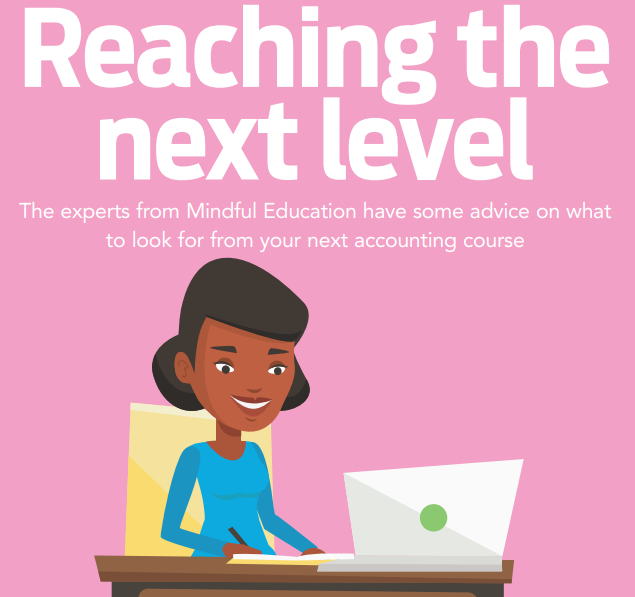June 2021
The experts from Mindful Education have some advice on what to look for from your next accounting course.
This spring and early summer, students will be focusing on completing their accounting studies, followed by preparing for their assessments. This year has been hugely disrupted, so many students will be working hard to catch-up, to complete their course or apprenticeship as originally planned.
Once you have crossed the finish line for your current accounting qualification – and taken a well-deserved rest! – it will then be time to start thinking about progressing to the next level. About how you might like to study, finding both the best training provider to suit your needs, as well as ensuring you’ve checked all the possible fees and funding options available to you.
How do you want to study?
The study method you choose will need to keep you motivated, while also giving you the best chance of achieving your qualification. There are three main options to consider:
• Blended learning: this is a highly flexible study method where students learn at their own pace online, in addition to meeting regularly with a college tutor who will guide you through the course. Classmates will also provide a valuable sounding board, both inside and outside the classroom, helping you to stay on track with your studies. The increasing driver behind blended learning is that it provides the best of both worlds for students.
• Face-to-face: students learn at the same pace (within the classroom), usually attending for two evening classes or one full day each week. Homework is set after class to help embed learning. Classmates will help you with interpreting new concepts and motivation, however this study method does lack flexibility for those with busy work or personal commitments.
• Distance: students learn independently and at their own pace using textbooks and/or limited online resources. Direct tutor support is likely to be very limited and you will have little or no interaction with other learners. Achievement rates tend to be much lower with distance learning – as low as 10% – so although this approach can be cost-effective, it is usually only successful for students who already have some experience or expertise, and who are highly-motivated to study independently.
Ask yourself which of these three study methods will be the best option for you, as hard work and dedication will certainly be needed for you to pass your exams, regardless of which choice you make. You should think about your preferred learning style and which approach is most likely to bring you success.
At Mindful Education we advocate blended learning as we believe learners benefit from the combination of flexible online lessons and also having a group learning element as part of their course. Research shows that when working together, learners are more motivated to achieve than they would be when working individually.
When learning in groups students also learn to inquire, share ideas, clarify differences, problem-solve, and construct new understandings.
Selecting your training provider
Once you have selected your preferred way to study, you will have a wide range of colleges and training providers to pick from.
The first step is to do some online research and create a shortlist of options, but you should avoid making your choice based solely on the contents of a provider’s website. If you can (Covid restrictions permitting), try to visit your college or training provider in person and speak with a tutor face-to-face. Alternatively attend a virtual open event and ask questions about how they deliver the course and their achievement rates (the percentage of people that start the course and go on to successfully complete their qualification).
You can also ask to speak to past or current students, check out review sites like Trustpilot, or look at Ofsted ratings. Reputable, established providers such as local further education colleges, should be happy to provide this information for you.
Accessing financial assistance for your course
When assessing the costs of your course, be sure to take a moment to look beyond the upfront cost, and bear in mind exam fees and membership costs for your chosen awarding body so that you are aware of the total overall cost.
When it comes to funding your course, there is a range of funding available to learners, both direct funding from the government as well as loan facilities that are also government-backed.
For example, Adult Education Budget (AEB) funding is available for level 2 AAT qualifications to part-fund or fully-fund your course (based on eligibility).
In addition, the government’s new National Skills Fund initiative means that the AAT level 3 course is now available fully-funded (in other words, free of charge!) for eligible learners. Even if you are not eligible for funding, you can access an Advanced Learner Loan through a college to cover the cost of study at level 3.
It’s worth noting that not all training providers will be able to provide you with these forms of financial assistance, but further education colleges are more likely than not to have funding and finance options. Be sure to speak with the college regarding the exact details for the accounting course you are considering.
If you’re interested in studying a flexible blended-learning course and would like to find out more about the funding available to you, then please contact your local college or training provider.
Alternatively, if you are interested in studying an AAT qualification using our Online and On Campus blended learning approach then do visit the Mindful Education website to find your nearest provider.
• Thanks to Mindful Education for this article




